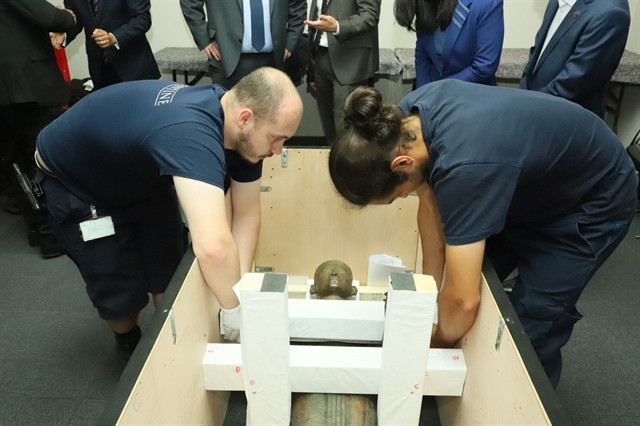 |
|
The bronze statue of four-armed Goddess Durga was recognised as a World Heritage by the UNESCO. — Photo courtesy of US Department of Justice |
The bronze statue of four-armed Goddess Durga, dating back to the 7th century, has been given back to Việt Nam at a ceremony that took place in London this week.
The statue, about two metres long and around 250kg in weight, was recognised as a World Heritage by the United Nations' cultural organisation (UNESCO). It was looted from the Mỹ Sơn Sanctuary in the central province of Quảng Nam in 2008.
The return of the artefact is the result of a long investigation by the US Homeland Security Investigations (HSI) into the activities of the art dealer Douglas Latchford, and their collaboration with London's Metropolitan Police to return stolen artefacts to their homelands.
The ceremony was attended by Ambassador of Việt Nam to the UK Nguyễn Hoàng Long, Minister Counsellor Tô Minh Thu, Special Agent JP Labbat, Special Agent Robert Mancene from the HSI, the representative of the HSI at the US Embassy in the UK, Tim Hemker, and police Inspector Sophie Hayes.
On June 22, the US Department of Justice issued a press release regarding the resolution of a civil lawsuit, resulting in the seizure of US$12 million from the sale of Southeast Asian artefacts from art dealer Latchford.
Latchford was indicted for wire fraud and other crimes, including the sale of looted Cambodian artefacts on the international art market for several decades.
He had forged documents such as certificates of origin, invoices, and transportation records, as well as falsified documents regarding the country of origin and excavation year of the antiquities.
From 2003 to 2020, Latchford got more than $12 million in payments for selling looted and smuggled antiquities from Southeast Asia to buyers and agents in the United States. He then transferred at least $12 million into a bank account in Jersey in the UK, and used the proceeds to purchase the bronze statue of Goddess Durga.
After his death in 2020, his daughter, Julia Copleston, inherited more than 125 statues and gold artefacts that the authorities accused of stealing from Cambodia, along with monetary assets.
 |
|
The bronze statue is carefully wrapped up before being handed over to Việt Nam. — VNA/VNS Photo |
In the settlement agreement, Copleston agreed to return $12 million and the bronze statue of Goddess Durga, which her father had purchased with illegally obtained funds and is currently being held in the UK.
Immediately after receiving the information from the Vietnamese Embassy in the US, the Vietnamese Embassy in the UK contacted the British Foreign Office and relevant authorities to initiate discussions regarding the repatriation of the statue.
At the reception ceremony on Wednesday, Ambassador Long expressed his emotions and gratitude for witnessing such a significant moment when a precious national treasure was returned to Việt Nam.
Long highly appreciated the effective coordination between the HSI and the Metropolitan Police. He also emphasised that the return of the statue took place in a very special context as Việt Nam and the UK were celebrating the 50th anniversary of diplomatic relations on September 11, and Việt Nam and the US had just upgraded their relationship to a Comprehensive Partnership during President Joe Biden's recent visit to Việt Nam.
This event would further deepen relations among all parties involved, he noted.
Hemker, representative of the HSI, said the return of the artefact was a proud and beautiful moment, adding that the HSI would continue their efforts to investigate and uncover trafficking networks and return the artefacts to their homelands.
According to Labbat from the HSI, the statue of Goddess Durga was very rare and highly valuable and more than 1,300 years old. It requires special preservation to ensure its proper care and protection.
The statue is currently being kept in a specialised room in London and in a relatively complete state if observed with the naked eye from the outside.
 |
|
Vietnamese Ambassador to the UK Nguyễn Hoàng Long (2nd right) and representatives from the HSI and London Police at the handover ceremony. — VNA/VNS Photo |
Based on the clothing and jewelry patterns on the statue, archaeologists have assessed that it could be a statue of a queen or a royal consort. There are some cracks and fractures on both ears, as well as on some fingers and the right foot.
The Vietnamese ambassador said the embassy would closely collaborate with relevant domestic authorities, storage and transportation companies, as well as insurance providers to ensure the safe transportation of the statue back to Việt Nam. — VNS